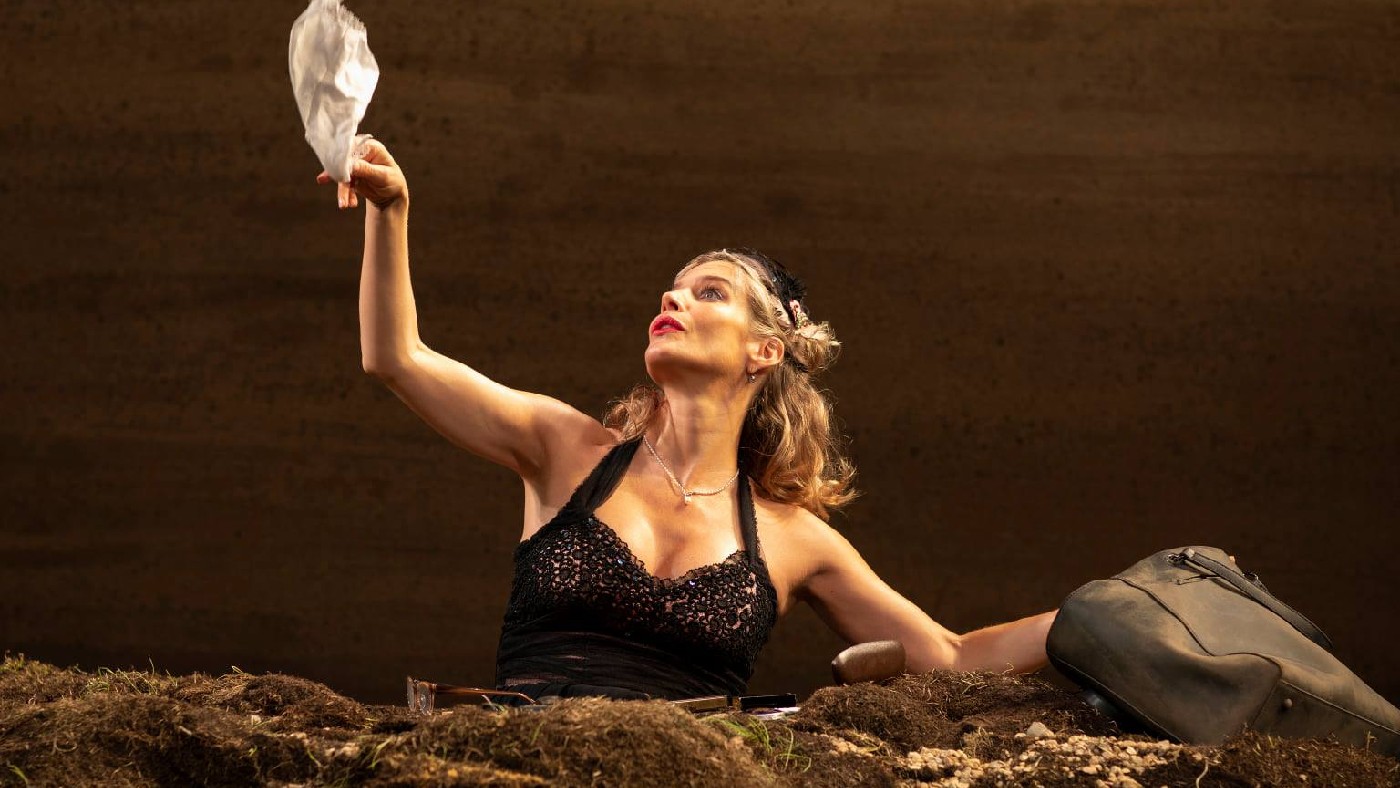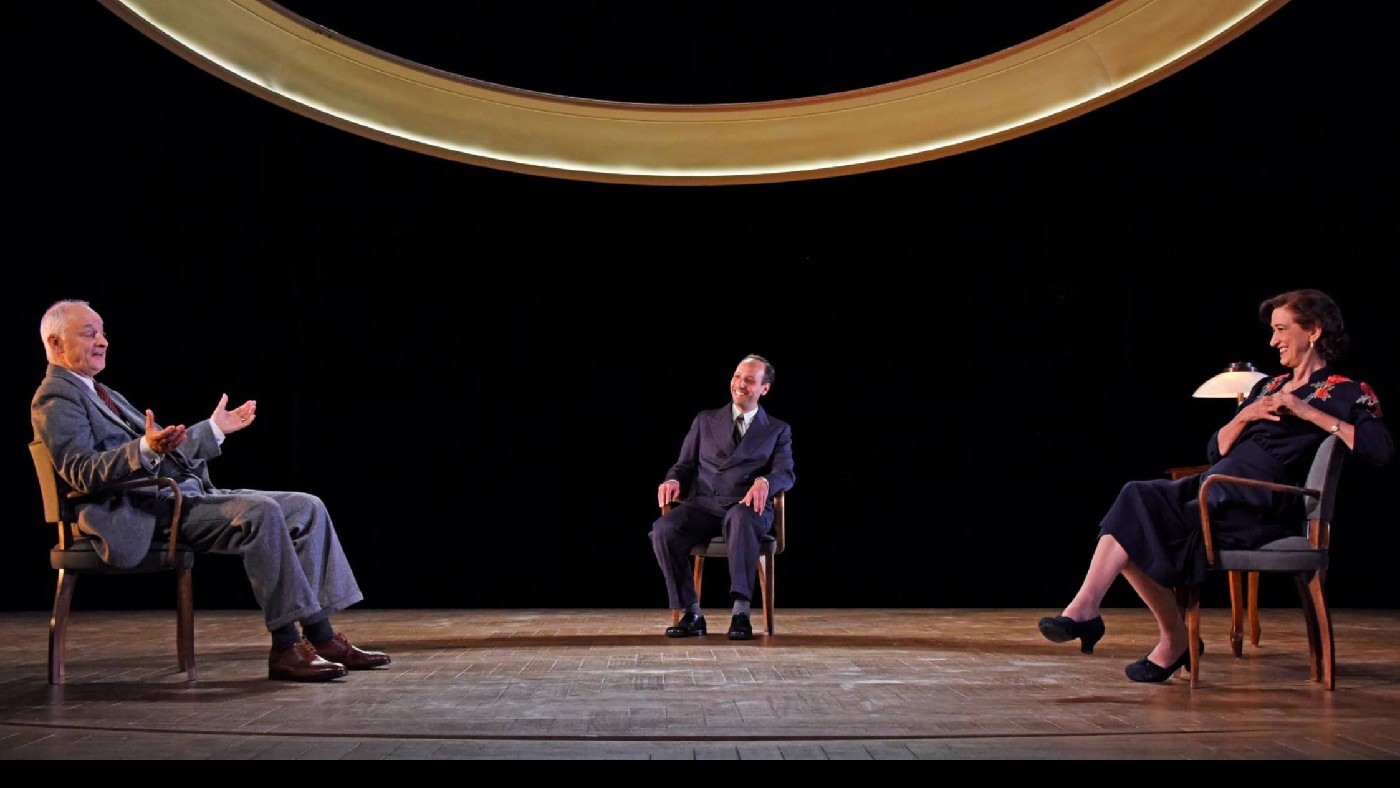Theatre of the week: Copenhagen, Happy Days, and Amadigi
What the critics are saying about these three acclaimed openings

A free daily email with the biggest news stories of the day – and the best features from TheWeek.com
You are now subscribed
Your newsletter sign-up was successful
Michael Frayn’s “copperbottomed modern classic” Copenhagen is a shrewd choice for staging amid the ongoing Covid uncertainty, said Dominic Cavendish in The Daily Telegraph. It features just three “carefully spaced” actors, no singing or dancing – and “enough food for thought” to leave theatregoers well “stocked up if the shutters came down again”.
This “demanding but brilliant” drama is about a meeting between nuclear physicists Niels Bohr and Werner Heisenberg in the Nazi-occupied Danish capital in 1941, said Patrick Marmion in the Daily Mail.
Theatre Royal Bath’s excellent revival (until 26 June, then touring to Southampton, Malvern and on) starts with lots of “mind-bending” chat about theoretical physics, but the production moves at “dizzying” speed and ultimately “achieves fission”, with its cast – Malcolm Sinclair, Philip Arditti and Haydn Gwynne – all on fizzing form.
The Week
Escape your echo chamber. Get the facts behind the news, plus analysis from multiple perspectives.

Sign up for The Week's Free Newsletters
From our morning news briefing to a weekly Good News Newsletter, get the best of The Week delivered directly to your inbox.
From our morning news briefing to a weekly Good News Newsletter, get the best of The Week delivered directly to your inbox.

Samuel Beckett’s 1961 play Happy Days is “the greatest show on Earth – and under it, too”, said Paul Taylor in The Independent. This “hilaro-devastating” masterpiece concerns a woman named Winnie who cannot move because she is “progressively entombed in scorched earth”: up to the waist at first, and later up to the neck.
It’s a sight, and a metaphor, that has “never lost its capacity to startle” – and proves as compelling as ever in this “beautiful, deeply considered” 60th-anniversary production from Trevor Nunn (Riverside Studios, London, until 25 July).
Irish actress Lisa Dwan is the “prima donna assoluta” of Beckettian interpretation. Here, in a static play that “demands everything from its central actor”, it is her “extraordinary vocal range” that gives the production its drama, said Arifa Akbar in The Guardian. Her “momentary plunges into hopelessness are heart-stopping”, though perhaps she “steers herself back to cheerfulness” a little too quickly.
Despite the challenges still facing the performing arts, the summer opera season is shaping up nicely, said Rebecca Franks in The Times. At Garsington, the director-designer Netia Jones has created a winningly inventive staging of Handel’s “magic” opera Amadigi (Garsington Opera until 24 July).
A free daily email with the biggest news stories of the day – and the best features from TheWeek.com
This “baroque rarity” is ideal for Covid times, as it has a small cast (only four main roles) and features lots of da capo arias, with little interaction between characters. Jones delivers plenty of visual spectacle, thanks to a design based around six large freestanding light-box pillars that move and rotate to create stunning patterns, grids and other effects. But her production remains fully focused on the “central human drama” involving the virtuous Oriana, the knight Amadigi, his rival Prince Dardano and the rejected sorceress Melissa.
All the leads impress, but countertenor Tim Mead, as the chain-smoking Dardano, provides “some of the most beautiful singing of the evening”.
-
 Political cartoons for February 14
Political cartoons for February 14Cartoons Saturday's political cartoons include a Valentine's grift, Hillary on the hook, and more
-
 Tourangelle-style pork with prunes recipe
Tourangelle-style pork with prunes recipeThe Week Recommends This traditional, rustic dish is a French classic
-
 The Epstein files: glimpses of a deeply disturbing world
The Epstein files: glimpses of a deeply disturbing worldIn the Spotlight Trove of released documents paint a picture of depravity and privilege in which men hold the cards, and women are powerless or peripheral
-
 Tourangelle-style pork with prunes recipe
Tourangelle-style pork with prunes recipeThe Week Recommends This traditional, rustic dish is a French classic
-
 Samurai: a ‘blockbuster’ display of Japan’s legendary warriors
Samurai: a ‘blockbuster’ display of Japan’s legendary warriorsThe Week Recommends British Museum show offers a ‘scintillating journey’ through ‘a world of gore, power and artistic beauty’
-
 BMW iX3: a ‘revolution’ for the German car brand
BMW iX3: a ‘revolution’ for the German car brandThe Week Recommends The electric SUV promises a ‘great balance between ride comfort and driving fun’
-
 Arcadia: Tom Stoppard’s ‘masterpiece’ makes a ‘triumphant’ return
Arcadia: Tom Stoppard’s ‘masterpiece’ makes a ‘triumphant’ returnThe Week Recommends Carrie Cracknell’s revival at the Old Vic ‘grips like a thriller’
-
 My Father’s Shadow: a ‘magically nimble’ love letter to Lagos
My Father’s Shadow: a ‘magically nimble’ love letter to LagosThe Week Recommends Akinola Davies Jr’s touching and ‘tender’ tale of two brothers in 1990s Nigeria
-
 Send Help: Sam Raimi’s ‘compelling’ plane-crash survival thriller
Send Help: Sam Raimi’s ‘compelling’ plane-crash survival thrillerThe Week Recommends Rachel McAdams stars as an office worker who gets stranded on a desert island with her boss
-
 Book reviews: ‘Hated by All the Right People: Tucker Carlson and the Unraveling of the Conservative Mind’ and ‘Football’
Book reviews: ‘Hated by All the Right People: Tucker Carlson and the Unraveling of the Conservative Mind’ and ‘Football’Feature A right-wing pundit’s transformations and a closer look at one of America’s favorite sports
-
 Catherine O'Hara: The madcap actress who sparkled on ‘SCTV’ and ‘Schitt’s Creek’
Catherine O'Hara: The madcap actress who sparkled on ‘SCTV’ and ‘Schitt’s Creek’Feature O'Hara cracked up audiences for more than 50 years